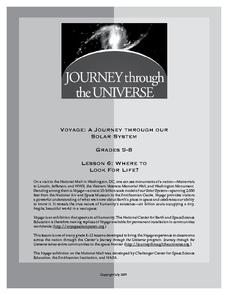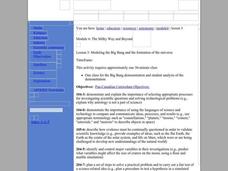Curated OER
Rotating Rings of Ice
Students work together to develop a model of Saturn and its rings. They identify what types of materials make up the rings and how they revolve around Saturn. They write a short paragraph describing the rings.
Curated OER
How Far Away is SOHO?
Students create a scale model of the Earth and the sun that demonstrates where the SOHO satellite is in relation to the Earth.
Curated OER
Robots from Junk
Students create balloon and rubber band models of robotic rovers to investigate the concepts of mass, torque, and friction. Through research and planning, students construct a rover test-bed that simulates the Martian environment.
Curated OER
It's A Meteor
Students complete a webquest to find Earth's relationship to the sun. In this webquest lesson plan, students complete tasks to understand the effect of the sun on weather and time. Students create a multimedia presentation as...
Journey Through the Universe
Where to Look For Life?
Every year we discover new planets including more than 1,000 in 2016 alone. Will we ever find life on another planet? The instructional activity includes two activities to help scholars understand this concept. First, they analyze the...
Journey Through the Universe
Is There Anyone Out There?
What is an alien's favorite game? All-star baseball! Scholars start defining living and non-living. Then, they conduct experiments to research if life exists, keeping in mind that life could be in many forms, not just human.
Curated OER
Galaxy Adventure
Working in groups, learners create a mnemonic device, give an oral presentation, and create a pictorial representation of the correct sequence of the planets and asteroid belt from the sun. An assessment rubric is included in the lesson.
California Academy of Science
Kinesthetic Astronomy: Mars Opposition Dance
Your class will watch as one child orbits the sun as Earth, while another orbits as Mars. If the timing is right, they will see the repetitive dance between the two planets and discover how often they are opposite from each other. For...
University of Colorado
Can Photosynthesis Occur at Saturn?
In the 19th activity of 22, learners determine if distance from a light source affects photosynthesis. Participants capture oxygen in straws and find that the amount of water the gas displaces is proportional to the rate of photosynthesis.
University of Colorado
Astro-Chronology
Class members play a version of the game Chronology to determine when certain scientific events occurred in history. Teams play until someone has 5-10 events in the correct order.
Science 4 Inquiry
The Impact of the Sun and Moon on Tides
In 150 BC, Seleucus of Seleucia theorized that the moon causes the tides. Scholars learn about what causes tides by studying the interactions of gravity between the sun, moon, and Earth. They use technology to formalize otherwise...
University of Colorado
Using Spectral Data to Explore Saturn and Titan
Saturn's rings are made of dust, ice, and solid chunks of material. Individuals use spectrographs in this final installment of 22 lessons to determine the atmospheric elements. They analyze spectrums from Titan's atmosphere and...
Curated OER
SIZING UP SOL
Ninth graders produce a projected, pinhole image of the sun and from measurement of the image and projection distance, calculate the actual size of the sun. They estimate the sun's apparent brightness from different planet.
UAF Geophysical Institute
Carbon Footprint
Your young environmentalists can calculate their carbon footprint and discuss ways to reduce it with a worksheet about climate change. After reading a handout about what impact one's carbon footprint can have on the environment, kids...
University of Colorado
Spacecraft Speed
Space shuttles traveled around Earth at a speed of 17,500 miles per hour, way faster than trains, planes, or automobiles travel! In the 13th installment of 22, groups graph different speeds to show how quickly spacecraft move through...
Curated OER
Sundials and Shadows - What Can They Teach Us About Seasons?
Students collect and analyze data relating to seasonal changes. They view a video, research web sites and build a sundial to collect their data.
Curated OER
Lenses and Telescopes
Students examine telescope construction. In this telescope lesson, students examine the lenses used in telescopes by exploring with convex and concave lenses.
Curated OER
A New Slant On The Seasons
Students identify how the tilt and position of the Earth causes the seasons. After a discussion of the seasons and when they begin. Using themselves as the objects in the universe, they role play how the rotational movement of the...
Curated OER
Planetary Diversity
Students explore the infrared radiation and the part of the spectrum that is not always visible. In this electromagnetic lesson students complete a lab activity on the different wavelengths.
Curated OER
I, Robot: Chapter Four- Catch That Rabbit
Sixth graders explore the development of technology in the 20th century. In this chapter lesson, 6th graders read and discuss the literary content of chapter four, I, Robot by Isaac Asimov. They research the technology that was...
Curated OER
Lunar Lollipops
Students simulate the phases of the moon using a lamp and styrofoam balls. In this lunar phases lesson, students stand around a lamp and act as Earth. They hold styrofoam balls and rotate to show the phases of the moon.
Curated OER
Elders' Weather Forecasting
Students interview an Elder to determine ways of forecasting the weather. In this weather lesson plan, students use the information from an interview to make a weather prediction.
Curated OER
The Big Bang Theory
Students will use scientific reasoning to formulate ideas about the formation of the universe using the Big Bang Theory. The use of critical thinking skills is part of the activity and the foundation of the scientific method will serve...
Curated OER
Measuring Temperature
Young scholars conduct an experiment using the steps of the scientific method. In this scientific method lesson, students experiment with temperature and record their findings using the scientific method. Young scholars complete a data...
Other popular searches
- Solar System Model
- Rubric Solar System Model
- Space Solar System Model
- Solar System Model Projects
- The Solar System Model
- Build Solar System Model
- Solar System Scale Model
- Solar System Model Lessons
- Building Solar System Model
- Scale Model of Solar System
- Solar System Model of Clay

























